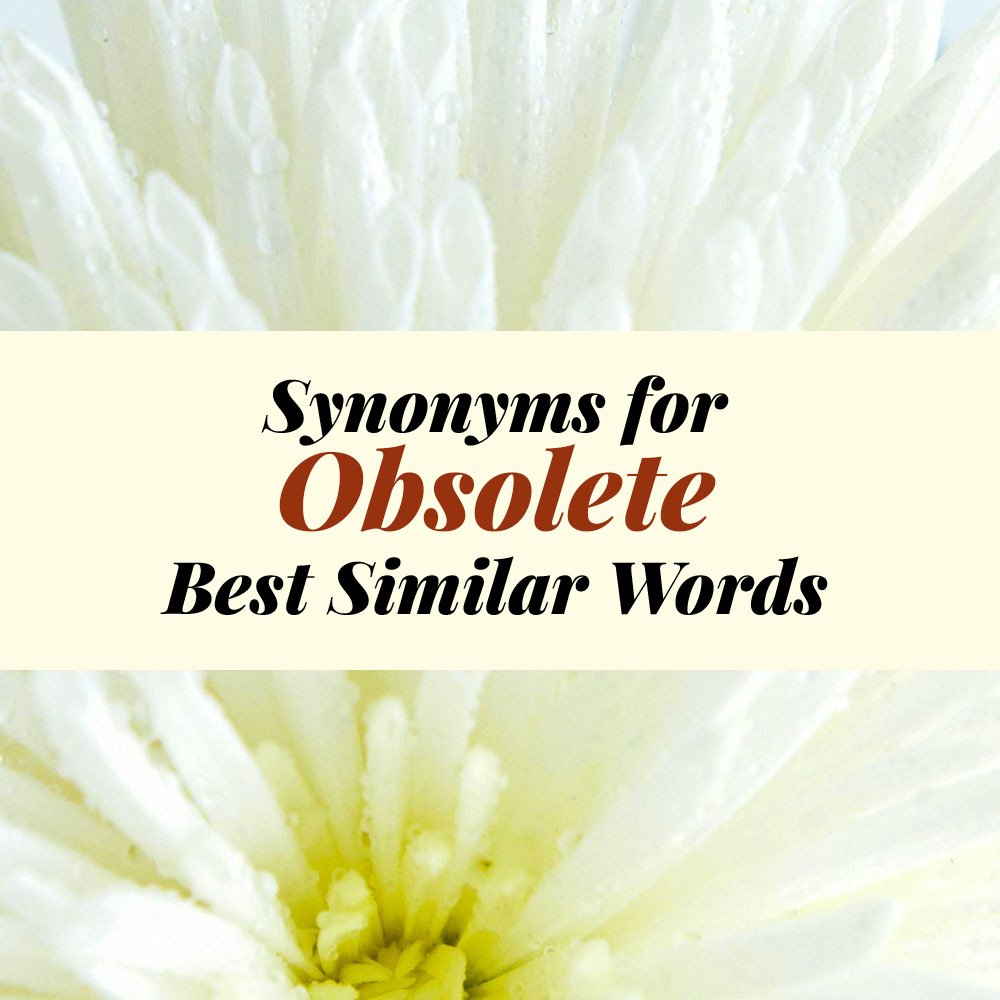Something becomes obsolete when it’s no longer used, old-fashioned, or replaced by something new. Many people use this word to describe ideas, tools, or trends that are outdated. However, there are many other ways to say obsolete, such as outdated, antiquated, or old-fashioned. These words bring variety and precision to your writing. In this article, we’ll explore 18 powerful synonyms for “obsolete” with examples.
| Synonym | Example |
|---|---|
| Outdated | That phone model is outdated and no longer works with modern apps. |
| Antiquated | The company still uses an antiquated filing system. |
| Old-fashioned | His old-fashioned attitude doesn’t fit in today’s world. |
| Archaic | Some archaic laws are still technically in force. |
| Dated | The website design looks dated compared to others. |
| Vintage | The store sells vintage cameras that no longer function. |
| Outmoded | The school replaced its outmoded textbooks with digital versions. |
| Ancient | They found an ancient map in the ruins. |
| Deprecated | That software version is deprecated and should not be used. |
| Extinct | The technology for VHS tapes is now extinct. |
| Passé | Wearing bell-bottom jeans is passé today. |
| Superseded | The new smartphone has superseded last year’s model. |
| Timeworn | The timeworn clock still ticks but barely keeps time. |
| Old-school | He drives an old-school car with no modern features. |
| Primitive | The tribe used primitive tools to hunt. |
| Worn-out | That worn-out printer can no longer produce clear pages. |
| Defunct | The defunct company no longer exists after bankruptcy. |
| Redundant | The old machines became redundant after automation. |
18 Different Ways to Say OBSOLETE: Another Word for Obsolete
1. Outdated
The word outdated is often used to describe something that has fallen behind current trends, technology, or standards. It is one of the easiest ways to say something is no longer useful or relevant. This term works well for describing objects, ideas, or even beliefs that have been replaced by newer ones. You can use it in both casual and formal contexts to describe things that need an upgrade or refresh.
- That computer is outdated and can’t run new programs.
- Her methods are outdated and no longer effective.
- The marketing strategy seems outdated in today’s market.
- This map is outdated and misses recent developments.
2. Antiquated
Antiquated gives a stronger sense of being very old and out of use. It is often used when describing systems, tools, or ideas that belong to a much earlier time. It implies that the thing is not only old but also inefficient for modern needs. This word works well in professional writing when you want to highlight that something must be replaced or modernized.
- The factory still uses antiquated machines from the 1950s.
- His antiquated views prevent progress in the company.
- They replaced the antiquated filing system with digital storage.
- That rule feels antiquated in today’s world.
3. Old-fashioned
Old-fashioned is a common and friendly way to describe something that feels from a past era. It can be used both positively and negatively, depending on the situation. When used positively, it may suggest charm or nostalgia; negatively, it can suggest being behind the times. It’s great for describing clothing, habits, or attitudes that no longer match modern styles.
- Her old-fashioned dress looked lovely at the vintage party.
- Some people think handwritten letters are old-fashioned.
- His old-fashioned manners impressed everyone at dinner.
- That café has an old-fashioned atmosphere that feels cozy.
4. Archaic
The word archaic refers to something extremely old or from an ancient period. It is often used for words, laws, customs, or systems that no longer fit the present time. It gives a formal tone and is often used in history or academic contexts. You can use it when something belongs to a much earlier era and has lost its relevance.
- Some archaic words are no longer used in daily speech.
- The law is archaic and needs to be updated.
- His ideas about education are quite archaic.
- They studied archaic symbols carved into the stones.
5. Dated
Dated suggests that something looks or feels from a past time and hasn’t kept up with current trends. It’s often used for designs, fashion, and styles that once looked modern but now seem old. The word doesn’t always mean useless—it can also imply something has lost its modern appeal. It’s a common term in design and entertainment discussions.
- The wallpaper looks dated and should be changed.
- That movie’s special effects appear dated today.
- His clothing style seems dated compared to modern trends.
- The logo design looks dated and needs a refresh.
6. Vintage
Vintage is an interesting word because it can mean old but valuable. It’s often used positively for items that have historical or nostalgic charm, such as clothing, furniture, or vehicles. When something is called vintage, it’s appreciated for its age and quality rather than seen as useless. It’s a great alternative when you want to express respect for something old.
- She collects vintage dresses from the 1940s.
- The bar has a vintage décor that attracts many visitors.
- His car is a vintage model that still runs perfectly.
- They displayed vintage radios in the museum.
7. Outmoded
Outmoded means something is no longer in fashion or use. It’s a formal word often used for systems, beliefs, or styles that have been replaced by better or newer ones. It suggests that the thing once worked well but now feels old or irrelevant. Use it when you want to sound thoughtful about progress or change.
- The school replaced outmoded books with tablets.
- Their outmoded system slowed down production.
- He stuck to outmoded traditions despite modern changes.
- The typewriter became outmoded after computers arrived.
8. Ancient
Ancient is a strong word that refers to something extremely old, often from thousands of years ago. It’s perfect for historical or archaeological contexts. Sometimes people use it in a lighter way to describe something just very old. It shows great age and sometimes admiration for how long something has lasted.
- They studied ancient ruins in Greece.
- That ancient clock still works after a century.
- His ancient phone can’t even connect to the internet.
- The museum has ancient pottery from Egypt.
9. Deprecated
Deprecated is often used in technical or software contexts. It means something is still there but should no longer be used because it has been replaced by a newer version. It’s useful when talking about programs, methods, or rules that still exist but are not recommended anymore. This word is common in technology, development, and documentation.
- The old feature is deprecated in the new software update.
- Developers should avoid using deprecated functions.
- That coding method is deprecated and will be removed soon.
- The app warns users about deprecated commands.
10. Extinct
Extinct means something has completely disappeared or no longer exists. It’s often used for species that are gone forever, but it can also describe technology, trends, or practices that have vanished. When you say something is extinct, it means it has no presence in today’s world. This word gives a strong sense of total disappearance.
- Many animals are now extinct due to climate change.
- VHS tapes are practically extinct today.
- The extinct company once led the industry.
- Some traditions are becoming extinct in modern society.
11. Passé
Passé is a French word used in English to describe something that’s out of style or unfashionable. It’s often used in discussions about culture, clothing, and trends. When something is passé, it means it was once trendy but now feels outdated. It’s a good choice if you want to sound a bit stylish while describing something old.
- Floppy disks are completely passé now.
- That hairstyle is passé and rarely seen today.
- Many believe printed newspapers are passé.
- The concept of landline phones feels passé today.
12. Superseded
Superseded means that something has been replaced by something newer or better. It’s often used in business, law, and technology to describe upgrades or new versions. This word highlights progress and improvement. When something is superseded, it’s not just old—it’s been replaced by something more effective.
- The old model was superseded by a more advanced design.
- Digital photography superseded film cameras.
- Manual filing systems were superseded by databases.
- The new law superseded the outdated one.
13. Timeworn
Timeworn means something shows signs of age or wear from long use. It often gives a feeling of nostalgia, charm, or history. This word is great for describing objects that are old but still meaningful or beautiful. It can also describe ideas or habits that feel tired after long repetition.
- The timeworn book’s pages were turning yellow.
- His timeworn jacket carried many memories.
- The town square has a timeworn beauty.
- Those timeworn traditions still bring families together.
14. Old-school
Old-school refers to something traditional or classic that belongs to an earlier period. It can be positive, showing respect for tradition, or negative, meaning behind the times. This word is very common in modern speech, often used to describe people, music, or styles. It’s both nostalgic and descriptive.
- He’s an old-school teacher who still uses chalkboards.
- That diner has an old-school charm.
- She prefers old-school music over modern pop.
- They play old-school video games for fun.
15. Primitive
Primitive describes something in its earliest form, simple, or undeveloped compared to modern standards. It can refer to tools, methods, or societies. When you use this word, it often means the thing lacks modern features or advancement. It’s useful when you want to emphasize how basic or rough something is.
- Early humans used primitive tools made of stone.
- The shelter was primitive but kept them warm.
- That software interface feels primitive today.
- They lived in primitive conditions without electricity.
16. Worn-out
Worn-out refers to something used so much that it’s no longer functional. It’s perfect for describing clothes, tools, or equipment that have reached the end of their life. It emphasizes physical wear rather than time alone. This word also carries a sense of tiredness or exhaustion when used for people or ideas.
- His worn-out shoes need to be replaced.
- The worn-out sofa lost all its color.
- That worn-out idea no longer inspires people.
- Our worn-out printer keeps breaking down.
17. Defunct
Defunct is used for things that no longer exist or operate. It’s common in business and technology, describing companies, products, or systems that have completely stopped working or been shut down. When something is defunct, it means it’s finished and no longer active in any form.
- The defunct airline was once the largest in the region.
- That defunct website used to be very popular.
- Many defunct factories stand empty today.
- The company became defunct after losing investors.
18. Redundant
Redundant means something is no longer needed because there’s a newer or better replacement. It’s often used for systems, jobs, or tools that have been replaced by automation or updates. It suggests overuse or duplication that has lost its purpose. This word fits formal and business contexts very well.
- The old machines became redundant after new ones arrived.
- Many jobs became redundant due to new software.
- That rule is redundant now that the law has changed.
- The feature was made redundant by the recent update.

Final Thoughts
The word obsolete has many alternatives, each bringing a different feeling or focus. Choosing the right synonym helps you describe age, change, or progress more clearly. Whether you say something is outdated, defunct, or antiquated, your word choice adds variety and meaning. These 18 synonyms will keep your writing fresh and expressive.









